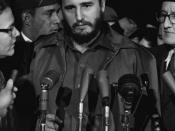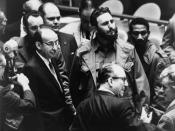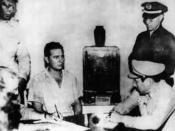During the heart of the Cold War, the heated focal point of the United States and the USSR shifted away from Europe, Asia and Africa for a few brief tense years, and locked in on one of the US' closest neighboring countries, Cuba. The antagonism that occurred between the US and Cuba during 1959 to 1963 can be largely attributed to the change of regime from Batista to Fidel Castro in 1956, manifested in the arenas of economics, international politics and ideologies, and finally, the military.
Cuba's close proximity to the North American continent had provided the nation with vast consumer markets since the end of the 18th century, after the estimated 300,000 French Haitian laborers with advanced technology and skills emigrated into the country. Though Cuba was the main exporter of "King Sugar", coffee, tobacco and fruit, the need to import basic grains and other foods did not wane; the US, Cuba's closest neighbor, became a main source of trading markets and supply of imported goods.
Antagonism occurred economically when Castro began to develop trading relations with countries that were not the US; tension grew stronger when the USSR was one of the countries that Cuba sought to partner. For example, in May 1960, the Castro's officials announced American-British refineries in Cuba were to process Soviet crude oil instead of Venezuelan Oil, Eisenhower suspended Cuban sugar import for the rest of the year, bringing Castro to retaliate by nationalizing all American sugar mills in the country. When asked about the reasons why the government adopted communism, Castro said, "...At that time American economic pressures of all types began. They became stronger and stronger... We must not forget that they [the United States] took our sugar quota, which was four million tons... We were a colony...Why our gratitude to the...


